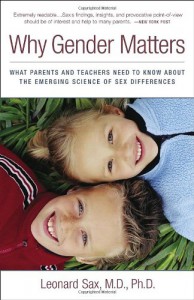Currently reading
Scholar Warrior: An Introduction to the Tao in Everyday Life
Great Expectations
Saknes un pēdas.
Neuromancer
The Pity of War: Explaining World War I
Creativity: Flow and the Psychology of Discovery and Invention
The Real Frank Zappa Book
The New Drawing on the Right Side of the Brain
Fun with Chinese Characters
Baltijas Valstu vēsture
Why Gender Matters: What Parents and Teachers Need to Know about the Emerging Science of Sex Differences
 Leonard Sax's Why Gender Matters sets out to persuade that biology plays a significant role in how gender works, that we are not born androgynous blank slates that are molded by societal expectations and enculturation alone, and purports to back up his claims with data from scientific studies.
Leonard Sax's Why Gender Matters sets out to persuade that biology plays a significant role in how gender works, that we are not born androgynous blank slates that are molded by societal expectations and enculturation alone, and purports to back up his claims with data from scientific studies.Now, going wherever the evidence leads you to, particularly if it works against your interest is one of the most admirable intellectual endeavors one can embark on - so my intuition was that if it would turn out that the evidence uncomfortably pokes at our modern, ultimately noble, but potentially misguided egalitarianism (gender-blind being the term that crops up in the book), then so be it - and hope we end up all the better for knowing the truth. The author even voices his frustration with there seemingly being only two positions to be had - either the PC flavoured gender-equality-or-else stance and appealing to traditional roles for the sake of appealing to traditional roles. So far, so good.
The first few chapters of the book start with stories that have the air of verisimilitude, if not actual veracity on their side (I'll get to that soon enough).
1) One story is about how a lack of either awareness of mindfulness of the differences in hearing ability between boys and girls at young ages could also result in a difference in how the (mostly female, the author stresses to point out) teachers treat them - i.e. mistaking a boy simply not hearing the teacher's commands for being disobedient.
For me, these comprise the book's strongest cases for its thesis in that at least the first one seems to rely on actual studies, and they both seem to be neutral enough at first glance to not have an agenda behind them. The devastating fact is that the second story can be detected to be a gross oversimplification even without all that much mental gymnastics (you don't need to fall back on biology to justify the author's chosen anecdotes even if you could go about it that way), and the first story is just plain wrong, if not even deliberately misleading.2) Another, more flimsy, but still I-could-see-how-this-works story covers how boys think in verbs and girls - in nouns purporting to explain why children pick the toys they do and draw the things they draw in arts classes.
The shortcomings of these chapters are significant, because they are the closest the author ever comes to the title's espoused rigorous scientific approach. As you read on, the tone uncomfortably shifts towards pandering the author's own various opinions and agendas (i.e. single-sex schooling) that all amounts to the all too tedious "I have many opinions, all of them correct, and here is how curious anecdotes and selectively chosen studies support them" that even the best among us invariably fall for time to time, but should be below par to anyone claiming to have thought deeply about the topic, and thus daring to go all prescriptive on his readership.
While I have my own issues with the book so far as I've read it (that I'll hopefully be able to address in a separate review in the best of all worlds) - Cordelia Fine's [b:Delusions of Gender|8031168|Delusions of Gender How Our Minds, Society, and Neurosexism Create Difference|Cordelia Fine|https://d202m5krfqbpi5.cloudfront.net/books/1348833681s/8031168.jpg|12635310] debunks the validity of most such research as is used here (even so far as specifically mentioning the fallacies of Sax's reasoning), in exposing how flawed most of the studies surrounding sex and gender differences are - from methodology, study sample sizes, and all the way up to interpretation of data and rather illogical jumps to conclusions about test results for rats somehow being significant to the inner workings of their human cousins.
As far as the anecdotes go - one of their purposes in popular science books is to breathe life into data and make it less of an abstraction to the reader. Sax uses the anecdotes presented here not to elucidate wildly esoteric data, but rather convince himself and the readers that his opinions represent an immutable reality.
The author's stories somehow manage to simultaneously support all the traditionally accepted notions, like the system-thinking vs. empathy aptitude discrepancies among the sexes, to some rather modern ones - i.e. that homosexual men are actually hyper-masculine and so on. I guess one has to be grateful the gay section of the book wasn't as overtly homophobic as it could've been - but, while admitting that the more effeminate men are in all likelihood not quite as representative of the gay community as most non-queer people might think, Sax still can't explain them away and have his opinions hold. Sure, he addresses the existence of what he calls anomalous males and females - but all his reassurances are invalidated by a whole rant on how parents should deal with these gender-atypical children (spoiler alert: Sax's method of choice - forcing them into conformity, usually via team sports).
For all his purported facade of even-handedness, his actual beliefs about masculinity and femininity plummet fast to the traditional end of the spectrum as you go deeper into the heart of darkness that are the later chapters of the book. You have to look no further than the rather ridiculous masculinity and femininity tests he provides, and it should be abundantly clear how context-specific and subjectively flavoured his ideas of those concepts are. Worse still than being merely traditional is how terribly confused they are - as he insists upon projecting the masculine-feminine dichotomy to domains which have nothing to do with gender in particular so far as I can muster.
As mentioned, he continuously prescribes team sports as a solution to a number of gender-atypical cases in the book - but to me, all of these came across as blatant attacks on introvert kids (they were described as bookish and shy to engage in social situations) under the excuse to cure them of their gender-nonconformity. When reading these sections, you'd think he was completely ignorant of the entire existence of an introversion vs. extroversion dimension of personalities, which is kind of perplexing for a psychologist, but I suppose illustrates how blind-sighted he is with seeing gender and sex everywhere he looks.
The author holds unfavourable opinions towards video games and other (in his mind) male-typical hobbies, but - again - this more than anything illustrates a profound ignorance on his part about the fiction (fantasy) vs. reality issue and (at this point) unsurprisingly has him equate it with gender issues. To use one of his own more disturbing examples to this effect - he mentions the following about men and rape fantasies:
Aside the fact of how reliable a source a sex magazine is, it is astounding that Sax can bulldozer over the whole issue and fail to see the difference between someone having a kinky fantasy and a desire to deliberately inflict harm to another human being. Given this, it may not be that surprising that he also fallaciously draws the conclusion that playing violent video-games results in violent players, watching films and TV shows about serial killers somehow unleashes your inner Hannibal Lecter, and indulging in sexual fantasies somehow makes you a pervert and a rapist (or worse still - maybe he was implying that the desire to rape is somehow natural to men?).“Highly intelligent men are no less likely to fantasize about raping a woman than are men of below-average intelligence. The most common sexual fantasy in sex magazines is rape and/or bondage of a young woman.”
One could go on about the myriad of ways this book fails to deliver on the promise of a scientific backing for significant biological differences in the sexes, but whatever science is there is faulty at worst, skewed to the author's fancy at best - and the rest of the book is a parade of the author's pet biases packaged to mislead you in believing it actually is part of some larger corpus of research the author has spared you of reading by distilling it into his advice.
To paraphrase Hanlon's razor - I won't assume malice and insincerity where ignorance would suffice in regards to the author's opinions, but the way he presents the data, and some of the perplexing misunderstandings of human nature on his part do cast shadows on considering him a worthwhile expert in the field. His intentions may have been good, but we all ought to know, that without the rigour to test one's beliefs on the strength of their own merits rather than on its holder's desire for them to be true, they are but only passable pavement material.












